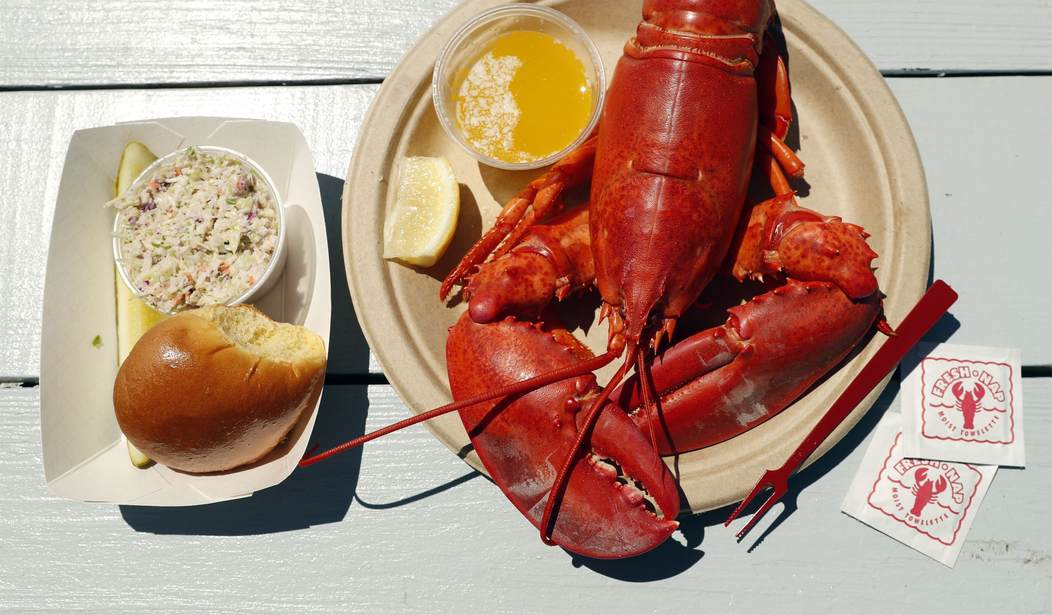National Lobster Day was established by Congress to celebrate the tasty crustacean’s place in
American history, culture, and commerce.
Sadly, due to President Biden’s offshore wind policies, and his agencies’ blame shifting, it may soon become a day to memorialize the passing of a great industry, tradition, and a tasty meal.
On December 1, President Joe Biden hosted a state dinner with French President Emmanuel Macron, at which more than 200 Maine lobsters were served.
The dinner was rife with hypocrisy since earlier in his administration, Biden’s National Marine Fisheries Service, an office in the National Atmospheric and Oceanic Administration (NOAA), issued new restrictions on Maine’s lobster fishers to protect North American right whales from entanglement with lobster fishing gear.
Mind you, the Biden administration enacted these rules despite limited or no evidence that lobster traps were harming the whales.
Maine’s lobster fishing industry filed a lawsuit to block the rules. The plaintiffs’ claim the rules will force the majority of lobstermen, who are family-owned, single-boat operators, out of business, leaving only a few large-scale operators, who have permits to operate in federal as well as state waters, catching lobster in Maine’s waters.
Although entanglement in fishing gear was implicated in nine NARW deaths since 2017 and 19 serious injuries, none of these deaths was caused by entanglement with lobster fishing gear. NOAA’s own data covering all whale species show discarded fishing nets, long-line fishing gear, monofilament, and nets—all tied to large-scale commercial fishing operations—are responsible for the vast majority of whale entanglement injuries. This abandoned fishing gear is the same material which makes up a large percentage of the plastic waste floating in the world’s oceans and almost all of it comes from overseas commercial fishing operations.
Recommended
From 2020 through 2022, NOAA determined that no right whales were injured from entanglement in Maine lobster fishing gear. Indeed, there has never been a documented whale death or serious injury linked to the Maine lobster fishery.
If America’s lobster fishers aren’t responsible for the rise in very visible whale deaths over the past few years, then what is.
Collisions with ships are the single biggest human-caused reason for whale deaths in U. S. waters. Despite this, the Biden administration has initiated efforts to build 45,000 megawatts of offshore wind facilities in federal waters by 2035. All of this development and the shipping it requires is right smack dab in the middle of critical whale habitat and migration routes.
Since the COVID pandemic, ports and shipping lanes on the U.S. east coast have surpassed those on the west coast as America’s busiest. Part of the increased ship traffic is due to the rapid deployment of hundreds of ships involved with mapping federal waters to site industrial offshore wind developments.
Aside from the ships themselves, the high-decibel sonar emitted by wind industry vessels to map the ocean floor for offshore wind siting poses a huge threat to whales. Who says so? NOAA’s own Chief of the Protected Species department, Sean Hayes. In a letter to the Interior Department objecting to the reckless expansion of offshore wind, wrote:
“Additional noise, vessel traffic and habitat modifications due to offshore wind development will likely cause added stress that could result in additional population consequences to a species that is already experiencing rapid decline. Wind turbines may disrupt the dense concentration of zooplankton that the whales depend on for sustenance, potentially forcing them to spend more energy and take more risks searching elsewhere for food.”
Hayes’ concerns have since been borne out by an increase dead whales washing up on eastern U.S. shores, 60 recorded whale deaths of all species on the East Coast since December 1, 2022, and more than 200 since the offshore wind industry first started ramping up operations of the U.S. east coast in 2016. Hayes’ concerns have also been confirmed by a new documentary by noted environmental author, Michael Shellenberger.
In a New York Post article, Shellenberger explains how offshore wind development is contributing to whale deaths, writing, “There appear to be at least two distinct mechanisms by which wind industry activities are killing whales.”
The first is through boat traffic in areas where there hasn’t historically been traffic,” says Shellenberger. “The second is through high-decibel sonar mapping that can disorient whales, separate mothers from their calves, and send them into harm’s way, either into boat traffic or poorer feeding grounds.”
In the end, the North Atlantic right whale and other whale species faces many threats. But lobster fishing is not significant among them. Yet the lobster industry may suffer for the sins of the offshore wind energy industry and its promoters in the Biden administration.
So as we celebrate the lobster on National Lobster day (while we still can), some of us with bibs and garlic butter sauce, let’s place the blame for the increasing number of whale deaths were it belongs, on Biden’s rapid, little studied push to expand offshore wind. For whales, most especially the North Atlantic Right Whale, the expedited development incentivized by the Biden administration could well qualify as an extinction-level event.
H. Sterling Burnett, Ph.D., (hsburnett@heartland.org) is the Director of the Arthur B. Robinson Center on Climate and Environmental Policy at The Heartland Institute, a non-partisan, non-profit research organization based in Arlington Heights, Illinois.

























Join the conversation as a VIP Member